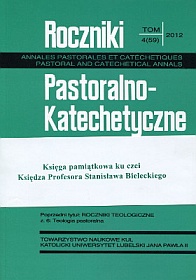The atmosphere of dialog and its influence on the course of the dialog process
Abstract
The article discusses the issue of the atmosphere of dialog and its influence on the course of the dialog process. The atmosphere is first of all created by people, and this is why in the first part of the article it is shown, taking the personalistic approach, what emotional mood, intellectual aura and spiritual atmosphere are favorable for having a dialog. On the emotional side it is enthusiasm, surges of emotions, and sublimity; in the intellectual aspect it is objectivism, pragmatism and acting logically; and in the volitionary-spiritual dimension – it is acceptance of people, tolerance and kindness. In the further part of the article attention is paid to the subjective and objective factors creating a dialog. The following ones belong here: pro-social education and self-education, a positive influence of public opinion, and on the objective side: some global civilization trends, and the communication revolution in the world, owing to which not only did tools for indirect inter-personal relations (the press, radio, television, Internet) gain importance, but also direct inter-personal communication did.
In the third part of the article the means used for building the atmosphere of dialogue are discussed. The status of natural behaviors should be appreciated here: politeness, simplicity and understanding; and defective behaviors, like obsequiousness, pompousness, crudeness and leniency should be eliminated. It is also indispensable to look for the way of the golden mean between extreme behaviors. Such a way between oversensitiveness and callousness is – sensitivity; between euphoric behavior and fatalism – realism, and between doctrinairism and utilitarianism – humanism.
The article is closed by the conclusion that the atmosphere of dialog influences the dynamics of the dialog processes, determining priority goals in the dialog and stimulating further dialogs.
References
Baczyński A.: Telewizja a świat wartości. Kraków 2003.
Bugajski M.: Język w komunikowaniu. Warszawa 2006.
Chełpa S., Witkowski T.: Psychologia konfliktów. Praktyka radzenia sobie ze sporami. [b.m.w.] 1999.
Gehlen A.: W kręgu antropologii i psychologii społecznej. Warszawa 2001.
Griffin E.: Język przyjaźni. Warszawa 1994.
Lepa A.: Świat propagandy. Częstochowa 1994.
Niwiński T.: Ja. Łódź 1994.
Psychologia społeczna w relacji ja–inni. Red. S. Moscovici. Warszawa 1998.
Stanosz B., Nowaczyk A.: Logiczne podstawy języka. Wrocław−Warszawa−Kraków−Gdańsk 1976.
Ury W. L.: Dochodząc do zgody. Taszów 2006.
Wal J.: Vademecum dialogu. Kraków 1998.
Wojtyła K.: Osoba i czyn. Kraków 1985.
Vauthier É.: Voir plus clair en pastorale? Langres 1979.
Zulehner P. M.: Helft den Menschen leben. Für ein neues Klima in der Pastoral. Freiburg−Basel−Wien 1978.

